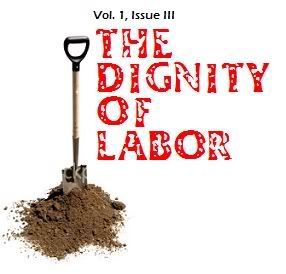
The term "barista" is occasionally thrown about to make coffee shop workers sound respectable, and thus respected, but I have yet to meet the person fooled by this charade. People on both sides of the counter understand the concept perfectly: one group is rich enough to spend five dollars a day on a disposable luxury item, and the other group is desperately clawing their way toward financial stability, many of them waving their hard-earned college degrees in the air like so many white flags.
At its best, this arrangement breeds a sort of community: the workers, not invested enough in their job to put on airs of professionalism, engage their regulars in witty banter and prepare their drinks with care borne not out of love of the job but out of genuine affection for their patrons. At worst, however, the system mirrors indentured servitude: underfed peons begrudgingly preparing items they cannot themselves afford for the disdainful, idle rich. During a six-hour shift, one might be praised or insulted, amused or angered, hugged or hit; perhaps all of the above. The sheer volume of customers and speed at which they are dispatched from the counter ensures that, at the very least, no day will be boring or routine.
It was in this environment that I witnessed some of the most aggravating and disappointing behavior our society has to offer. Often, it was the simplest cruelties that were hardest to fathom: neglecting to say "hello" or "thank you," talking on their cell phones while ordering, leaving their spilled drinks for someone else to clean up. Even before my position as a barista, I was careful to avoid such behavior because I was raised to be polite. It is important to recognize other people as other people. However, these subtle daily devaluings were punctuated on occasion by true achievements in assholery, and these are the stories that I tell at parties when people ask about what it's like to work at a coffee shop for four years.
The quickest transformation from man to monster occurred one winter when the guy with the goiter walked in. (You judge us, we judge you.) He was a regular, but not one whose drink I remembered, an oversight I would soon regret. A tall man, he stared down at me and ordered a 16-ounce mocha with a little whipped cream. I gave him his total, accepted his payment, and ditched the register for the espresso machine. Now, laid out on the page, his order seems quite specific, and I will admit to some culpability in this interaction. My work did not, in truth, adhere to his exact specifications, and when I handed him a 16-ounce mocha with whipped cream, the disappointment was plain on his face. There was a tense moment as I awaited the verbalization of the complaint clearly forming in his mind, but my fear eased as he silently sauntered to the opposite counter to claim a drink stirrer and lid for his cup. It was wrong of me to lower my defenses, however, for it stung all the more when he earned his dramatic triumph. Swiveling sharply, he met my eyes and calmly muttered, "I said a little whipped cream," while slowly running the stir stick over the top of his cup, his one smooth motion sending a heavy dollop of milky froth plummeting to the carpet below. Victorious, he capped his drink and left without another word. I wish I could say I recovered from the shock quickly enough to laugh in his face, but the thought materialized too late.
I also wish I could say that I passed my four years of servitude without a visit from the local law enforcement officials, but this simply isn't the case. For a reason I am at a loss to explain (people with advanced psychological degrees tend to find themselves more gainfully employed), people who spend long hours at a coffee house tend to feel that it is, in fact, their house. As such, they begin to take liberties one would not take at a restaurant or other business. For instance, making off with a newspaper without paying for it was all too common. The practice became so rampant that customers began to point it out to the counter staff, indignant that they were sacrificing their hard-earned quarters while others got their headlines for free. Most of the employees didn't care too much, or didn't want to rock the boat. I, on the other hand, felt fairly invincible given the length of my tenure and depth of my skill, so when I spotted one of the deviants (wearing a full suit, no less) heading towards a table with his ill-gotten goods, I made a mental note. He sat benignly reading the news; I stood casually ringing up other customers. Finally, the moment of truth arrived, and I pounced. When he returned to the counter for a refill, I charged him 55 cents: 30 for the coffee, and 25 for the paper. The surge of pride I felt was disproportionate.
Sadly, so was his reaction. Within minutes, he was on the phone with the police, who arrived in baffling numbers. I was pulled aside and questioned, calmly informing the officer that I had merely charged the gentleman for the newspaper that was still clearly laid out on his table. There was a general confusion over why city officials needed to be involved in this situation. The man insisted that I had slandered him by accusing him of theft, a charge that he steadfastly denied on the grounds that he would put the paper back (he didn't, and even if he had, it would have borne the smears of ten crumb-caked, thieving fingers). Finally, the officers, five in all, departed, with one woman staying behind to inform me that she couldn't arrest the fellow because the paper never left the premises, but that if it happened again she'd be happy to help me file a restraining order. I wouldn't have, but it turned out not to be necessary: shamed and affronted, the man defected to a state-wide chain that had opened across the street.
And yet for all the drama, indecency, and health code violations, I can truly say that I enjoyed my time at the coffee shop. I became a staple in the lives of hundreds of locals. I saw them more often than most of my family members and was likely the first person that some people said hello to every morning (for those who bothered to say hello). These people permeated my life: sitting in the audience when I got cast in local shows, helping me find jobs when I got desperate, and even offering condolences after my mother's death. On my last day, people expressed genuine disappointment that I would be leaving. Tips doubled. Some hugged me. Others tried to convince me to stay, even for just one morning a week. One woman, one of the many whose name I do not recall but whose 12-ounce café au lait I will never forget, came back hours after getting her drink, thankful that she had caught me before the end of my shift because she had brought a present and a card. Unaware of the fact that I had spent years looking forward to the day when my house no longer reeked of coffee, she had gotten me a latté-scented candle.


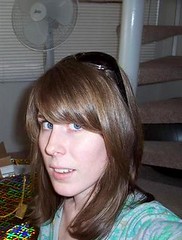


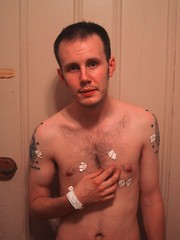
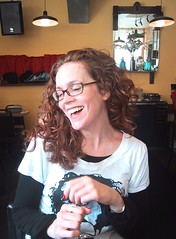
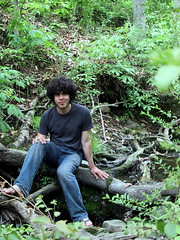

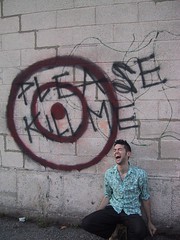

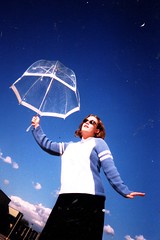

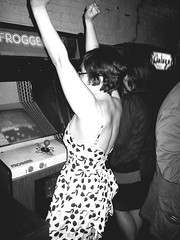


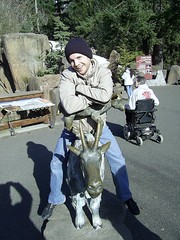


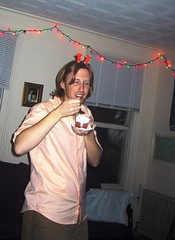

2 comments:
At least you still have a deep and abiding love for coffee. If I get within three feet of ranch dressing, my mouth, my uvula inverts.
oh, dunns.
Post a Comment